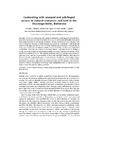Contending with unequal and privileged access to natural resources and land in the Okavango Delta, Botswana

View/
Date
2008Author
Mbaiwa, J. E.
Ngwenya, B.N.
Kgathi, D.L.
Publisher
Blackwell http://www.wiley.com/10.1111/j.1467-9493.2008.00332.xType
Published ArticleMetadata
Show full item recordAbstract
This paper reviews how state policy and regulatory instruments, including protected area alienations
and concessions, have altered or denied the access to land and natural livelihood resources
of the indigenous Basarwa and minority subsistence-oriented communities in the Okavango Delta (OD) in Botswana. Drawing on field research and guided by a sustainable rural livelihoods
framework, the paper provides an overview of key institutional interventions – in particular the
setting up of the Moremi Game Reserve, Wildlife Conservation Policy, Tourism Policy, Agricultural
Development Policy and the erection of veterinary fences – that have served to privilege a foreign-owned and dominated commercialized wildlife and nature tourism sector and the export-oriented
beef industry in the OD. The officially sanctioned barriers to customary and usufructory
rights and access, and the non-recognition of historically embedded traditional land uses have decimated already marginalized resource-based subsistence livelihoods, and precipitated intergroup
conflicts over preferential rights and access to resources and opportunities, notably wildlife,
non-timber veld products, agriculture and community-based tourism schemes. Such outcomes,
moreover, will have consequences for the longer-term sustainability of the OD both as a socioeconomic
resource base and as a natural ecosystem.
